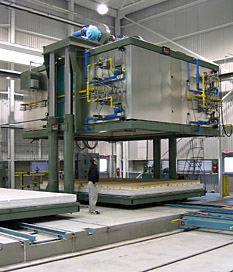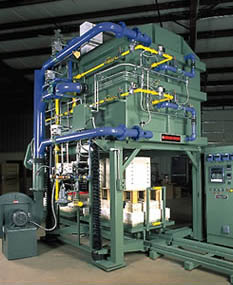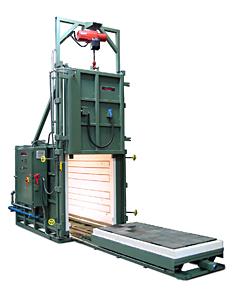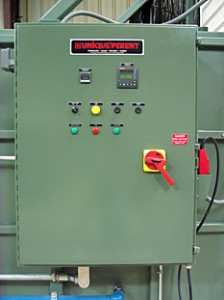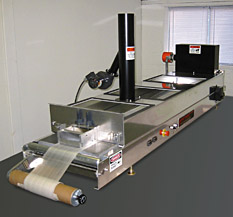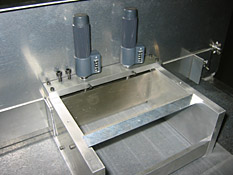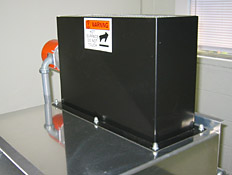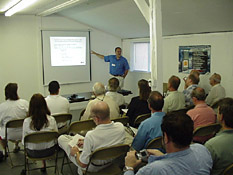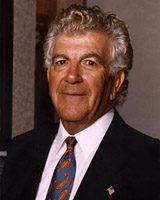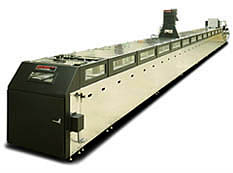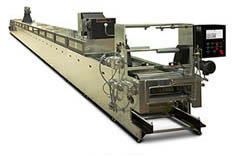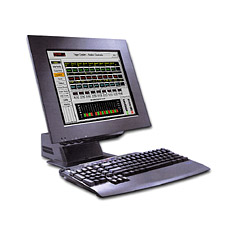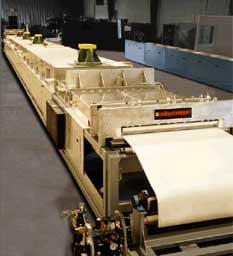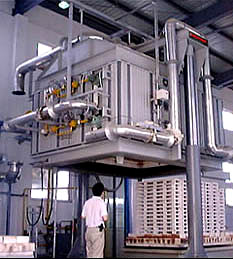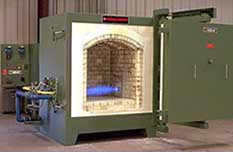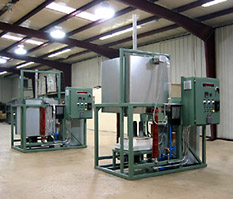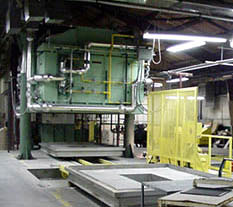HIGH TEPMPERATURE KILNS FOR ADVANCED CERAMICS
by James W. Dennis – President of HED International, Inc
The continued trend toward the development of advanced ceramic materials and related products has resulted in a greater need for reliable, specialized high temperature kilns. In particular, gas fired high temperature periodic (GFHTP) kilns are commonly used to process engineered alumina ceramics for applications such as semiconductor manufacturing equipment, microelectronics, and biomedical devices.
These GFHTP kilns typically fire to temperatures between 1550°C and 1820°C and can range in size from 0.2 cubic meters to as large as 50 cubic meters. Standard features include a very low 60°C startup and hold capability, excellent temperature uniformity throughout the kiln including +/- 5°C at low temperatures and approaching +/-1°C at elevated temperatures, and the ability to precisely control the kiln atmosphere between oxidizing and reducing conditions. These features make the GFHTP kiln an important part of many advanced ceramics production processes.
In addition to the demands of emerging technologies, advances in refractory materials, combustion components, and control systems used in GFHTP kilns have also brought about further improvements in the firing process. Moreover, engineering know-how, manufacturing experience and technical support are much more critical for a new GFHTP kiln installation than traditional thermal process systems. While there are applications better suited to continuous processing or electric radiant heating, in general, those high temperature processes that require the best possible temperature uniformity, firing flexibility, and production efficiency will find the modern GFHTP kiln a good fit.
The most common GFHTP kilns are box, elevator, bell, and shuttle type designs. Factors such as setting space needs, firing turnaround time, factory floor space, financial constraints, and personal preference will influence the decision to choose one type of GFHTP design over another.
From the process perspective, setting size is an important consideration when choosing the kiln type. For example, temperature uniformity is excellent in a front-loading box kiln up to 0.8 cubic meters after which limitations of burner configurations as well as loading restrictions become limiting factors to performance. In sizes up to 6 cubc meters, elevator kilns offer excellent temperature uniformity by providing more possible burner configurations, loading flexibility, and kiln car sand seal system.
Bell type designs offer the greatest temperature uniformity in relation to overall kiln size because they utilize a downdraft exhaust system that greatly reduces the thermal losses that occur in updraft systems. Bell kilns recently supplied for technical applications in the 50 cubic meter sizes have provided temperature control within +/-1°C from cold to soak. However, these are design generalizations, as both box, and elevator types may be designed with downdraft exhaust and recuperator systems. In addition to the setting size, the density and overall weight of the product, the method of loading and unloading the product, and the length of the firing cycle are also important considerations when selecting the kiln type.
Box kilns are better suited for small production cycles or research and development firings in which the product can readily be loaded and unloaded by hand. Elevators offer the best of both worlds, providing both versatility and production capabilities. Bell Kilns are ideal for volume production of technical ceramics and product loads that are especially large and heavy.
Manufacturer’s of technical ceramics continue to make products that push the envelope of materials engineering. These products are much more expensive per cubic centimeter than their traditional ceramic forbearers ever were, and the firing process requirements are far more demanding and critical. Fortunately, the modern gas fired high temperature periodic kilns is meeting those requirements today.
HED International, a leader in the design and manufacture of processing systems, has installations worldwide used in the production of advanced ceramics, fuel cells, rechargeable batteries, capacitors, electronic materials, thermal plastic adhesives and other tape cast products.
For more information on UNIQUE/PERENY Series of energy efficient kilns and furnaces, please contact:
HED International, Inc.
P.O. Box 246, 449 Highway 31
Ringoes, NJ 08551
Fax: 609 466-3608
Phone: 609 466-1900
Web-site: www.hed.com
Email: info@hed.com
New Energy Saving Electric Car Bottom Shuttle Furnaces!
HED International introduces the new Heavy-Duty UPK Series of energy saving electric car bottom Shuttle/Bogie Heath Furnaces. Designed for debinding and sintering or other heat treatment requirements, the new UPK Series furnaces utilize quick cooling and residual heat to provide faster firing and rapid recycling. UPK Series furnaces are available with one or more cars or bogie hearths that are readily accessible for loading by several people or material handling equipment for heavy workloads. This allows the furnace to be firing one bogie while another is being loaded.
UPK Series Standard Features: 1000˚C, 1340˚C and 1400˚C Models
- Extra heavy duty welded steel shell finished with heat resistant enamel paint and COOL SKIN double wall sidewalls that minimize exterior surface temperatures.
- Electric heating elements distributed on the interior sidewalls provide uniform heating and long service life.
- Temperature control is programmable with SCR power regulation to precisely control heat-up rate and set point with roof dampers that enable rapid cooling.
- A duplex type thermocouple is provided for operation control and over-temperature limit safety shut-down.
- Electrical components include a door safety switch, and main control panel safety circuit breaker. The entire system meets applicable NFPA, NEC and CE directives and is completely wired ready for operation after connection to the required electrical service.
HED International, a leader in the design and manufacture of processing systems, has installations worldwide used in the production of advanced ceramics, fuel cells, rechargeable batteries, capacitors, electronic materials, thermal plastic adhesives and other tape cast products.
For more information on UNIQUE/PERENY Series of energy efficient kilns and furnaces, please contact:
HED International, Inc.
P.O. Box 246, 449 Highway 31
Ringoes, NJ 08551
Fax: 609 466-3608
Phone: 609 466-1900
Web-site: www.hed.com
Email: info@hed.com
CONSIDER LAB-CAST SERIES OF TAPE CASTING MACHINES FOR RESEARCH & DEVELOPMENT
DESIGN
The HED International Lab-Cast Model TC-71LC Tape Caster has been designed specifically to meet the needs of the small developer and is ideal for lab scale studies. Lab-Cast is simple to use yet sophisticated enough to provide a versatile research and development platform. This system allows developers to have a natural transition to HED International’s PRO-CAST Series of Tape Casting Machines, when a full-scale production system is required.
SPECIFICATIONS
- Overall Length: 9.66′ (2.95 meters) nominal
- Casting Length: 7′ (2.13 meters) nominal
- Casting Width: Up to 12″ (300mm) wide
- Casting Speed Range: 2 and 20 inches/minute (ipm)
DESCRIPTION
Individual welded sections of aluminum compose the drying chamber and are joined together to form a continuous enclosure with an aluminum plate forming the chamber floor. The chamber is equipped with tempered glass view ports that are removable for product access.
Casting is with a doctor blade on a granite surface plate. The precision surface plate is securely mounted in a height adjustable support fixture at the entrance end of the tape caster.
A manually adjustable exhaust fan is located near the entrance end of the tape caster for efficient counter-flow removal of casting vapors.
A 3 KW heater is located at the exit end of the tape caster, in the inlet duct, to enable counter-flow heated circulation through the drying chamber. Electric resistance heaters are attached to the underside of the drying chamber and arranged into one temperature control zone. Each zone of heat is equipped with independent temperature sensing and control.
A variable speed drive, designed for use with paper or Mylar, a carrier payout, spool shaft with manual tension adjustment, and an easily removable carrier take-up spool are provided.
All control instrumentation, switches, function labels, status lights, relays and fuses are located in the caster structure. The electrical service is 115V/230V/60Hz.
HED International, a leader in the design and manufacture of processing systems, has installations worldwide used in the production of advanced ceramics, fuel cells, rechargeable batteries, capacitors, electronic materials, thermal plastic adhesives and other tape cast products.
For more information on our Lab-Cast or PRO-CAST Series of Tape Casting/Coating Systems, and UNIQUE/PERENY Series of energy efficient kilns and furnaces, please contact:
HED International, Inc.
P.O. Box 246, 449 Highway 31
Ringoes, NJ 08551
Fax: 609 466-3608
Phone: 609 466-1900
Web-site: www.hed.com
Email: info@hed.com
HED International Hosts CANJ Summer Technical Meeting and Golf Outing
HED International, Inc., a leader in the engineering and manufacture of advanced thermal process systems hosted the annual Ceramic Association of New Jersey (CANJ) summer meeting at its Ringoes, New Jersey headquarters. The CANJ meeting featured a technical session with presentations by Dr. Richard Haber, professor of ceramic engineering at Rutgers University and Bob Horvath, M.S. Materials Science Engineering, Rutgers and the Manager of Manufacturing Operations at HED. In the afternoon, attendees participated in a golf outing at neighboring Heron Glen golf links followed by a buffet dinner and awards presentation.
“We are proud to host the summer meeting of the CANJ for the second year in a row. It is a great forum for people to meet their colleagues in the materials industry in New Jersey and surrounding areas.” – Jim Dennis, President HED International, Inc.
HED International, Inc.
P.O. Box 246, 449 Highway 31
Ringoes, NJ 08551
Fax: 609 466-3608
Phone: 609 466-1900
Web-site: www.hed.com
Email: info@hed.com
HED Chairman honored as American Ceramic Society Fellow
John S. Dennis, Chairman of HED International, Inc. was honored as an American Ceramic Society Fellow at the 107th Annual Meeting Awards Banquet in Baltimore, Maryland, April 2005.
Holder of a B.S. in Ceramic Engineering from Alfred University, an M.S. in Ceramics and Ph.D. to the dissertation from Rutgers, an Honored Ph.D. from Florida and a pilotÕs license, instrument certified from the FAA.
Previously employed as President of HED International, Inc. (1980-2000); Vice President of The American General Energy Corporation (1973-1980); Vice President of The Research and Development Products Co. (1962-1973); Technical Director of United Clay Mines Corporation (1957-1962).
Holder of several of U.S. and foreign patents for thermal material and process equipment; Speaker and author/coauthor of papers for the American Ceramic Society, Canadian Ceramic Association, Society of Glass and Ceramic Decorators, Ceramic Association of New Jersey, Pennsylvania Ceramic Association at Penn State University, and Rutgers University Seminars Program. Recipient of the Sylvania Fellowship Alfred University, ÒOutstanding Young Men of American Award,Ó Ceramic Association of New Jersey Annual Award, Medal of Merit Award by President Ronald Reagan, Past Member of NICE and The Keramos Honor Society.
Since 1957, a member of the American Ceramic Society, presently Emeritus, with Trenton Section of ACERS, and affiliated with the Material and Equipment Division.
For more information about the American Ceramic Society Awards Banquet click here.
HED International, Inc.
P.O. Box 246, 449 Highway 31
Ringoes, NJ 08551
Fax: 609 466-3608
Phone: 609 466-1900
Web-site: www.hed.com
Email: info@hed.com
Advancements In Tape Casting Machine Technology
By James W. Dennis, Pro-Cast Division
HED International, Inc., Ringoes, NJ
The last century has seen the development of tape casting technology and the fabrication of thin layers of materials to produce single layer or stacked and laminated multilayer structures. Today, tape casting is the basis of the fabrication process that is routinely used in the production of multilayer ceramic capacitors (MLCC), low temperature co-fired ceramics(LTCC), lithium batteries, fuel cells and many new microelectronic devices.
The diversity of applications and new product developments has become the driving force for many of the recent advancements in tape casting machine technology. Tape casting machines have become more automated and other modifications have made fabrication easier and improved quality. The latest tape casting machines, (Fig.1) produce better tape with more uniform thickness and much thinner dimensions.
Tape cast parts now can be made as thin as 1 to 2 microns and as thick as 6 mm. These can be produced to widths that exceed 2 meters and lengths that are only defined by production schedules. This versatility facilitates subsequent procedures to fabricate the final shape or part, many of which could not be produced by any other processing technique.
This new generation of tape casting machines integrates a sturdy structure with a solid, level platform that uniformly supports a moving casting surface that may consist of a steel belt, polymer carrier or both. Totally enclosed machines provide a clean room environment to minimize undesirable air infiltration and contaminants. Viewing doors with tempered glass windows and seal tight gaskets allow fast, easy access to the casting station and all other functional areas. In addition, the machines are designed to deliver conditioned casting material consistently to the casting/coating station. The main components of the casting station are the casting head, the casting surface and the web, carrier or steel belt. The casting head can be a slot die, roll coater, adjustable doctor blade or comma bar that is precisely made so as to allow work to tolerances of less than 1 micron. The casting surface substrate can also be a high precision plate such as granite certified flat to 50 millionths.
To produce a steady stream of uniform tape requires a stable flow of casting material, perfect control of the casting speed, and drying conditions. Precise control of the tension and speed of the moving carrier or steel belt conveying the tape through the entire tape casting machine is essential to ensure uniformity. This is accomplished by using tension monitors and a digital tachometer with a microprocessor controlled drive and closed-loop feedback system.
The importance of properly drying the cast tape is a major concern and factor in machine design. The result is that the drying oven on new tape casting machines is carefully designed to maintain a stable temperature profile, atmosphere saturation gradient and air flow. Drying is done in two ways. Heat is gradually applied below the tape while a carefully controlled flow of heated atmosphere is passed over the tape surface. It has been found that more perfect dry tape is produced when these oven conditions are precisely controlled and can be tailored for any tape thickness and drying characteristic. The objective is to dry the tape as thoroughly and as quickly as possible while preventing uneven drying such as forming of a dry skin on the exposed surface of the tape. This defeats sub-surface drying and causes defects like cracking and curling. An adjustable air flow exhaust fan draws HEPA filtered air over the tape in a counter flow direction. As the atmosphere flows from the dry exit end of the tape casting machine oven to the front end where skin formation is the biggest problem it slows and becomes saturated enough to prevent excessive drying. Microprocessor controls and sensors can be set to maintain a desired atmosphere saturation gradient across the drying oven.
After drying, the moving tape can be subjected to quality control checks, cut to length, trimmed and slit into narrower widths before being collected or rolled onto a product take-up spool (Fig.2). The newest tape casting machines incorporate the best technology available like automatic web tracking to align the tape precisely so take-up is smooth and seamless as well as other “bells and whistles” that can be added to meet particular product manufacturing needs.
Today, tape casting machines utilize the latest computer control technology (Fig.3) such as human machine interface (HMI) control systems that deliver a simplified operator interface and graphic displays that provide essential information and ease of control leaving almost nothing to chance. These ‘what you see is what you get’ (WYSWYG) systems (Fig.4) are easy to use, shorten operator training time and dramatically increase productivity.
Although this technology was limited in the past, there should be no doubt that more recent developments will continue the march of progress in tape casting machine technology. Perhaps this could even lead to the “perfect” machine to make the “perfect” part every time.
HED International, Inc. is a leader in the design and manufacture of processing systems for technical ceramic and non-ceramic materials. For more information on our PRO-CAST® Series of Tape Casting/Coating Machines or our UNIQUE/PERENY® Series of energy efficient kilns, please contact
HED International, Inc.
P.O. Box 246, 449 Highway 31
Ringoes, NJ 08551
Fax: 609 466-3608
Phone: 609 466-1900
Web-site: www.hed.com
Email: info@hed.com
HED International Installs State-Of- The-Art PRO-CAST Tape Caster
HED International, Inc., a leader in the design and manufacture of casting/coating equipment for the production of thin and thick films, today announced that a state-of- the-art caster/coater has been shipped and installed at a major US based supplier of advanced electronics.
Valued at a half a million dollars, this unit was custom designed to meet the exacting requirements of the customer’s product. “Superior engineering, manufacturing and customer service are the keywords of our company. We work with our customers to provide equipment which will put them ahead in their field,” stated Katleen Kriskewic, Pro-Cast Division Sales Manager at HED International, Inc.
HED International offers a full line of versatile PRO-CAST® Series Casting/Coating Machines for the production of high quality cast/coated products. Systems range in length from 12 feet, ideal for lab scale applications, to over 100 feet for production models. They are available with a variety of casting surfaces, casting heads and carriers, and designed for batch or continuous production of flexible films. “Green” tape thicknesses from less than 0.001″ to 0.125″, and tape widths from 4″ to 52″, are routinely produced on the PRO-CAST® machines. The PRO-CAST® Series are “production proven”, having set performance standards in the production of millions of square inches of product. All are equipped with continuous conveyor systems with surfaces that assure imperfection-free castings/coatings. Production variables, such as conveyor speed, temperature profile, solvent gradient, and air flow, are adjusted and controlled precisely.
HED International, Inc. is a leader in the design and manufacture of processing systems for technical ceramic and non-ceramic materials. For more information on our PRO-CAST® Series of Tape Casting/Coating Machines or our UNIQUE/PERENY® Series of energy efficient kilns, please contact
HED International, Inc.
P.O. Box 246, 449 Highway 31
Ringoes, NJ 08551
Fax: 609 466-3608
Phone: 609 466-1900
Web-site: www.hed.com
Email: info@hed.com
HED International Introduces Bell Plus Kilns!
UNIQUE/PERENY’s high temperature Bell Plus Kilns are designed for temperatures up to 1800°C (3272°F) with capacities from 50 to 1000 cubic feet.
The fuel efficient design utilizes waste heat from kiln exhaust gases which pass through a convection type recuperator to preheat combustion air up to 1000°F. The preheated combustion air is conveyed through insulated pipe to high velocity burners that fire into lane arrangements designed to uniformly transfer heat throughout the product setting space. Each Burner provides optimum performance with separate zone control and high turn down capability. Required kiln atmospheres are achieved by digital control of air/gas ratios through the proprietary, mass flow, combustion system. UNIQUE/PERENY’s HMI control system software and PLC allow for programming and data logging from a remote PC.
The structure of the Bell Plus Kiln is similar to UNIQUE/PERENY’s successful Top Gun Elevator Series, with 15″ thick, interlocking refractory walls contained in a heavy duty, structural steel shell. Additional Bell Plus features include; pressure control, water cooling, recuperation and various combustion systems such as pulse, proportional or combination.
The Bell Plus Kiln introduces the ultimate technology available in combustion and control systems while still maintaining the robust structural and refractory designs that have been time proven for high temperature firing. The UNIQUE/PERENY recuperation system improves firing efficiency and can reduce fuel consumption up to 20%.
HED International, Inc. is a leader in the design and manufacture of processing systems for technical ceramic and non-ceramic materials. For more information on our PRO-CAST® Series of Tape Casting/Coating Machines or our UNIQUE/PERENY® Series of energy efficient kilns, please contact
HED International, Inc.
P.O. Box 246, 449 Highway 31
Ringoes, NJ 08551
Fax: 609 466-3608
Phone: 609 466-1900
Web-site: www.hed.com
Email: info@hed.com
Consider The HED International USA Series Of Kilns If You Require High Temperature Firing In Small Batches
HED INTERNATIONAL all new USA series of high temperature kilns are designed to meet capacity requirements from 5 to 20 cubic feet. The kilns feature a full opening, double hinged door which provides the operator with easy access for loading and unloading of the entire product setting area. The door has a parallel guide that ensures exact positioning when closing and keeps the Hot Face away from the operator as it is moved to the side when opening. The HED International Cool Skin technology provided on the kiln door ensure skin temperatures of less than 40 F above ambient. Swivel style clamping devices on the four corners ensure a positive door seal throughout the firing cycle.
The ISOMAX combustion system utilizes two (2) high velocity burners that are positioned to fire below the product setting space in a staggered relationship. A multiple loop programmer provides control of both the heating and cooling profiles. Oxygen enrichment and atmosphere control systems are available.
Using this combustion package it is possible to maintain holding temperatures as low as 90°C (184°F) while still having the thermal input capability of ramp rates as high as several hundred degrees per hour. Temperatures up to 1800°C (3272°F) are achieved with the oxygen enrichment system.
The fifteen-inch thick refractory wall includes a bubble alumina hot face that is secured by an exclusive interlocking anchor design. The combination of high velocity burners, multi-loop control and a high efficiency lining design insure superior firing uniformity and repeatability.
HED International, Inc. is a leader in the design and manufacture of processing systems for technical ceramic and non-ceramic materials. For more information on our PRO-CAST® Series of Tape Casting/Coating Machines or our UNIQUE/PERENY® Series of energy efficient kilns, please contact
HED International, Inc.
P.O. Box 246, 449 Highway 31
Ringoes, NJ 08551
Fax: 609 466-3608
Phone: 609 466-1900
Web-site: www.hed.com
Email: info@hed.com
HED International Offers Advanced Specialty Kilns
Firing and sintering specialized advanced ceramics demands a special kiln. HED International’s Unique/Pereny kilns are capable of precise atmosphere and temperature control. This especially applies for the temperature range of 60°C to 1800°C, in either electric or gas fired kilns. The primary process requirements are:
1) Residual carbon removal, i.e. binder burnout, requiring precise atmosphere and low temperature conditions,
2) Sintering or co-firing demanding uniform controlled atmosphere and temperature processing.
Gas fired kilns, equipped with high velocity recirculating burners utilize excess air at low temperatures and on-ratio operation at high temperatures to affect atmosphere and temperature uniformity within ± 2°C up to 1800°C.
Electric fired kilns, such as the top hat unit shown, are equipped with zone controlled heating elements and atmosphere recirculating inspiration jets (up to 1,000 fps), to achieve temperature uniformity of ± 2°C up to 1800°C. These jets add high velocity convection heat transfer to the electric infrared heating in the kiln. For example, the actual measured temperature uniformity values of a kiln firing to a setpoint of 1260°C are shown in the table below.
HED International, Inc. is a leader in the design and manufacture of processing systems for technical ceramic and non-ceramic materials. For more information on our PRO-CAST® Series of Tape Casting/Coating Machines or our UNIQUE/PERENY® Series of energy efficient kilns, please contact
HED International, Inc.
P.O. Box 246, 449 Highway 31
Ringoes, NJ 08551
Fax: 609 466-3608
Phone: 609 466-1900
Web-site: www.hed.com
Email: info@hed.com



